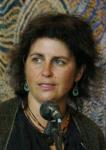Natalie Harkin is a poet and artist of Narungga descent (SA), a member of the Chester family from Point Pearce in South Australia. She has professional experience in government and non-government sectors, but mostly in the Indigenous higher education sector in South Australia. She has worked at Wilto Yerlo and Yaitya Purruna at the University of Adelaide, the David Unaipon College of Indigenous Education and Research at the University of South Australia and is working as a Lecturer with the Yunggorendi Student Engagement team at Flinders University.
In 2015 her collection of poetry titled Dirty Words was published by Cordite books.
Her current research centres on her Aboriginal family story and weaves together a love of storytelling, activism and resistance-poetics through art and literature, and Aboriginal writers and artists who engage critically with State record archives. She is weaving her own creative-nonfiction and poetic-prose throughout the research.
She has been an active member of the South Australian Aboriginal and Torres Strait Islander Storytellers and Writers Group and has shared her poetic-prose at conferences, local events and festivals, including a workshop with the 2014 International Writers Festival, Ottawa. Her words have also been projected in several exhibitions comprising text-object-video projection, including a basket woven from her grandmother and great-grandmother’s letters from the archives.
Natalie is also a member on the Tandanya National Aboriginal Cultural Institute Board, the Arts SA Aboriginal and Torres Strait Islander Arts Assessment Committee, and has contributed in a number of healing workshops through SA Link-Up, Aboriginal Community Homecare, and Aboriginal wellbeing camps for elders. In 2017 she was a member of the Indigenous Australian Dictionary of Biography working party.
Sources:
Courting Blakness website, hosted by AustLit.
Natalie Harkin, Flinders University
